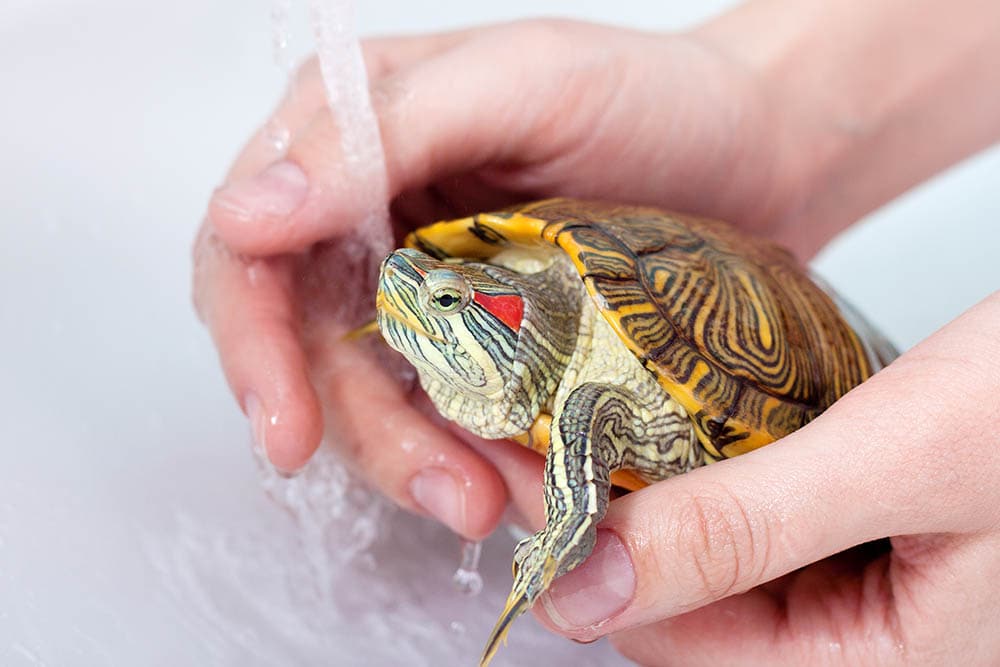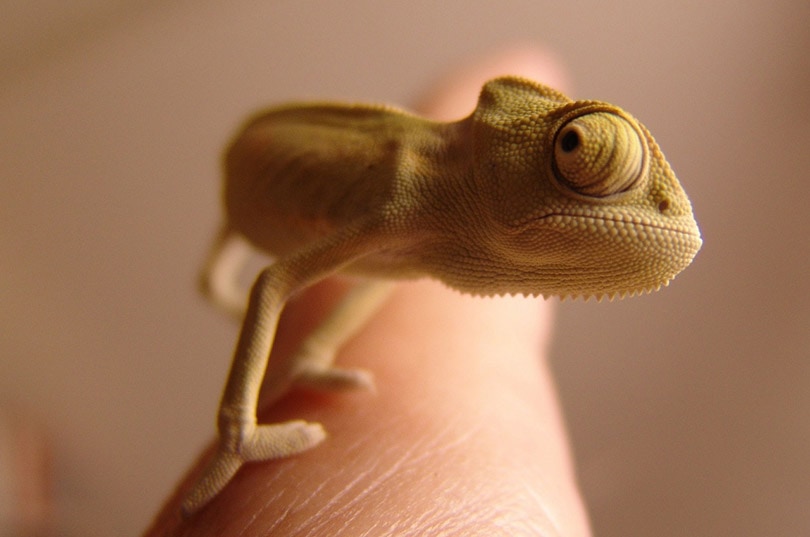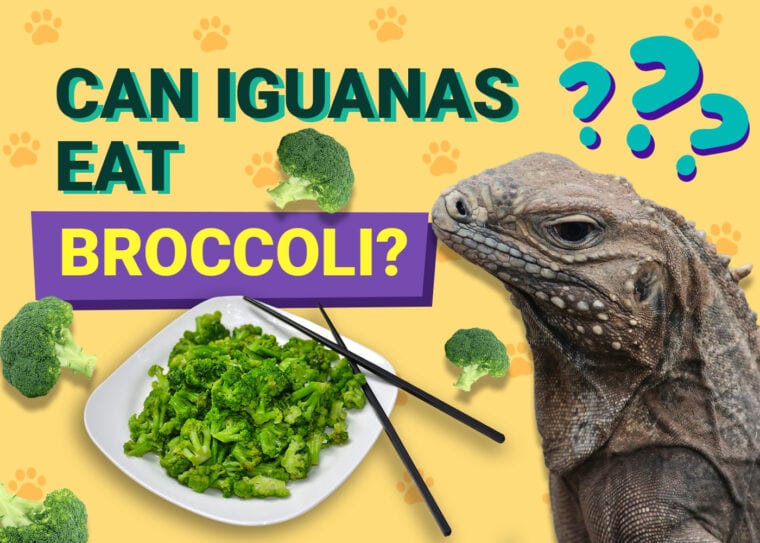
Iguanas are becoming a popular pet amongst reptile enthusiasts, and with any boom in popularity comes a boom in questions about the care and keeping of the said animal. Succinctly, yes, iguanas can eat broccoli. An iguana’s diet should be varied but consist mainly of plant matter, and broccoli is a safe and healthy treat for them.
 What Do Iguanas Eat?
What Do Iguanas Eat?
Iguanas are herbivores, and more specifically, they’re folivores which means they eat leaves. In the wild, iguanas will eat the leaves of trees and vines that they come across. Leaves make up almost 100% of an iguana’s wild diet. Iguanas are hindgut fermenters, and their stomach acid contains particular microbes designed to break down their high-fiber diet.
In captivity, we should strive to replicate this; our iguanas will thank us for it. Most veterinarians recommend feeding your iguana only plant material, but some will argue that supplementing a plant-based diet with up 5-10% canned or pelleted food can be an acceptable diet.
Veterinarians recommend that your iguana’s diet be made up of 80-90% dark leafy greens. These fiber-rich plants are great for your iguana’s digestive system and are a species-appropriate and nutrition-rich food source. Red, yellow, and orange vegetables can be offered to your iguana as well.
Your iguana can also eat fruits, but since fruits are very high in sugar, they should be less than 20% of your iguana’s diet. Ideally, they should be more of a treat than a meal.
You’ll want to avoid light green vegetables like iceberg lettuce as they’re made up mostly of water and don’t contain many nutrients.
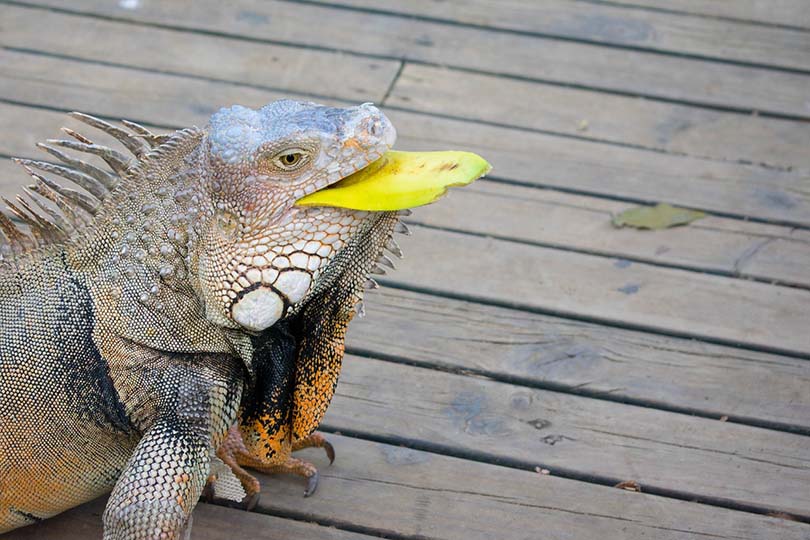
Iguana Diet Breakdown
Vegetables
Vegetables given to your iguana can be fed cooked or raw, but veterinarians recommend feeding your raw iguana vegetables. Cooking vegetables removes essential nutrients, so your iguana gets a higher density of nutrients in each bite by providing raw vegetables.
Calcium-rich greens like dandelion, romaine lettuce, alfalfa hay, bok choy, kale, parsley, Swiss chard, beet greens, collard greens, turnip greens, escarole, and kohlrabi should make up about 40-50% of your iguana’s diet.
Other vegetables such as broccoli, bell peppers, sprouts, sweet potato, parsnips, okra, squash, green beans, cactus, mushrooms, carrots, peas, corn, cucumber, and asparagus will compromise the next 30-40% of your iguana’s diet
Swiss chard, spinach, and beet greens are good sources of calcium but shouldn’t be your iguana’s primary food source. These greens contain oxalates which bind to other minerals in the intestinal tract and prevent absorption of the nutrients.
Additionally, cabbage, kale, and mustard greens contain goitrogens which can lead to hypothyroidism. So, these veggies should only be fed in small amounts.
Fruits

Iguanas tend to love fruits because they’re tasty and sweet, but they’re low in nutrients and high in sugars and water, so they should be fed sparingly and make up less than 20% of your iguana’s diet.
Fruits such as tomatoes, mangos, bananas (with the skin on!), apples, grapes, pears, star fruit, peaches, guava, melon, kiwi, dates, blueberries, figs, raspberries, and strawberries make great top garnishes for your iguana’s salads. Still, they shouldn’t be their primary source of food.
Flowers & More
You can also give your iguana edible flowers as a treat. Geraniums, dandelions, hibiscus, nasturtiums, carnations, and roses make excellent treats that you can provide your iguana like you would give a dog a biscuit!
Young iguanas can be given legumes as part of their diet. Legumes can make up to 5% of a young iguana’s diet but should be phased out as they reach adulthood.

Can I Feed My Iguana Animal Protein?
Animal proteins such as crickets, mealworms, and boiled eggs are usually too dense in proteins to be fed to iguanas regularly. If provided, animal proteins should make up less than 5% of an iguana’s diet. Young iguanas can have a protein content of up to 10% to help them grow, but like legumes, they’ll need to be phased out as they reach adulthood.
You shouldn’t feed your iguana cat or dog food, even if you are feeding your iguana animal proteins. Cat and dog food contains too much fat, protein, and vitamin D for iguanas to consume safely.
Do Iguanas Need Vitamin Supplements?
It’s not uncommon for animal care to involve vitamin supplements nowadays. Food production companies have learned what they need for some animals, and they add supplemental vitamins to their store-bought food.
However, for animals fed an organic diet like iguanas, the onus is on the pet parents to make sure that any supplemental vitamins are given.
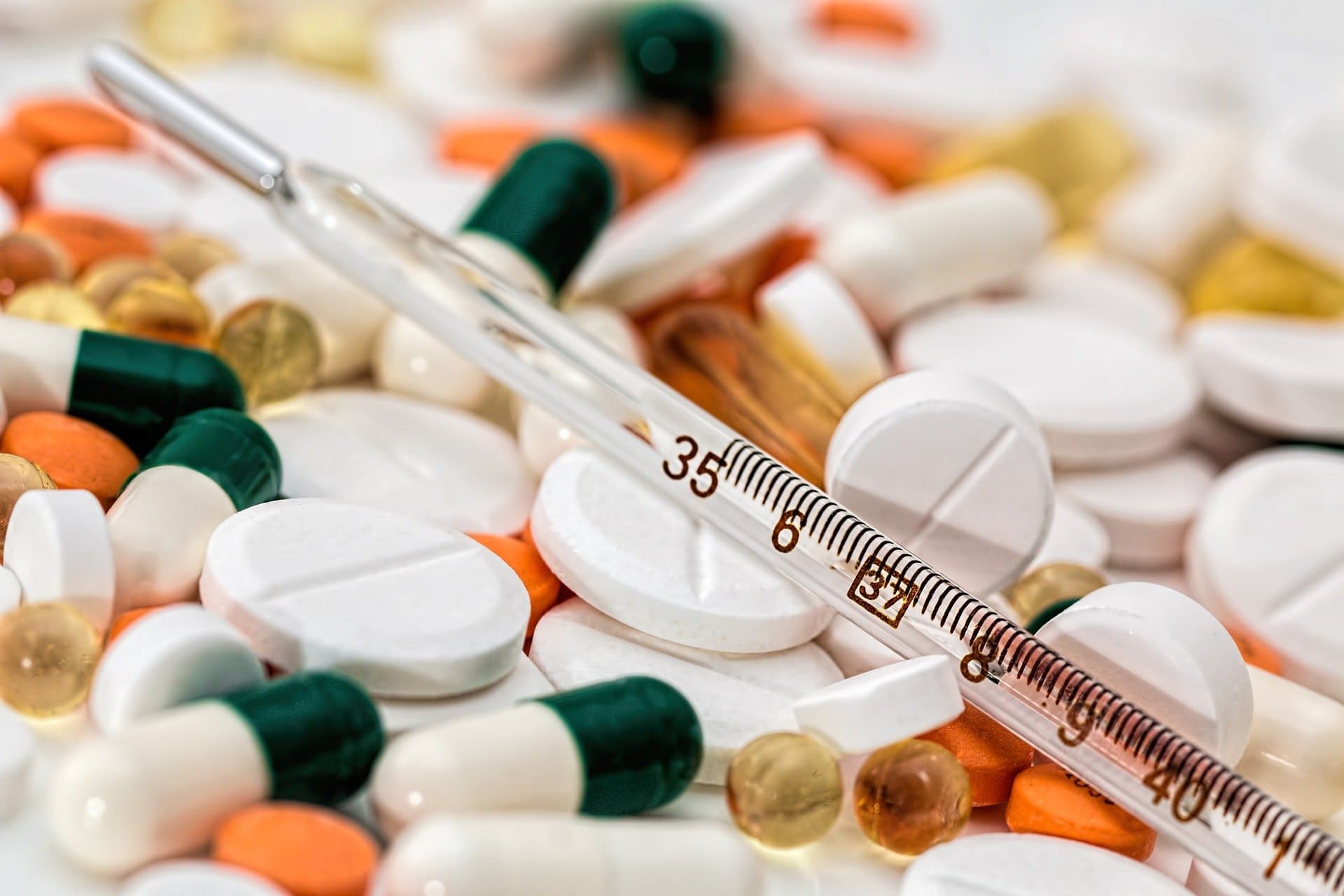
The Importance of Calcium for Iguanas
Iguanas have a higher need for calcium than other reptiles, and veterinarians recommend giving your iguana a calcium supplement to help them stay healthy.
Reptile-specific calcium supplements should be sprinkled on your iguana’s food to promote good health. It’s essential not to use human calcium supplements for your iguana. Unlike human-grade supplements, reptile-specific supplements won’t contain phosphorus or vitamin D, which aren’t as necessary for reptiles.
Young, growing iguanas will need to have a calcium supplement every other day. In contrast, an adult iguana will usually only need calcium supplements once or twice a week.
There is some debate on whether iguanas can absorb vitamin D from their food. The science is still underway to understand whether they can absorb only vitamin D through their skin. Despite this, veterinarians recommend a vitamin D supplement be given to your iguana about twice per month.
Domestic iguanas usually are kept indoors in places with less sunlight than is necessarily appropriate for them, and while UV lighting can help, it often isn’t enough. So, a vitamin D supplement may be helpful for them in maintaining good health.
Does My Iguana Need Water?
Iguanas need water, but not from a bottle. Iguanas should be given a water bowl as they drink from the water bowl and bathe in it. Iguanas can absorb water through their skin, so bathing in their water bowl helps them stay hydrated.
Change the water in the bowl often since they will sometimes void their bowels or bladder while bathing and mist your iguana with a spray bottle a few times a week to help them stay hydrated.
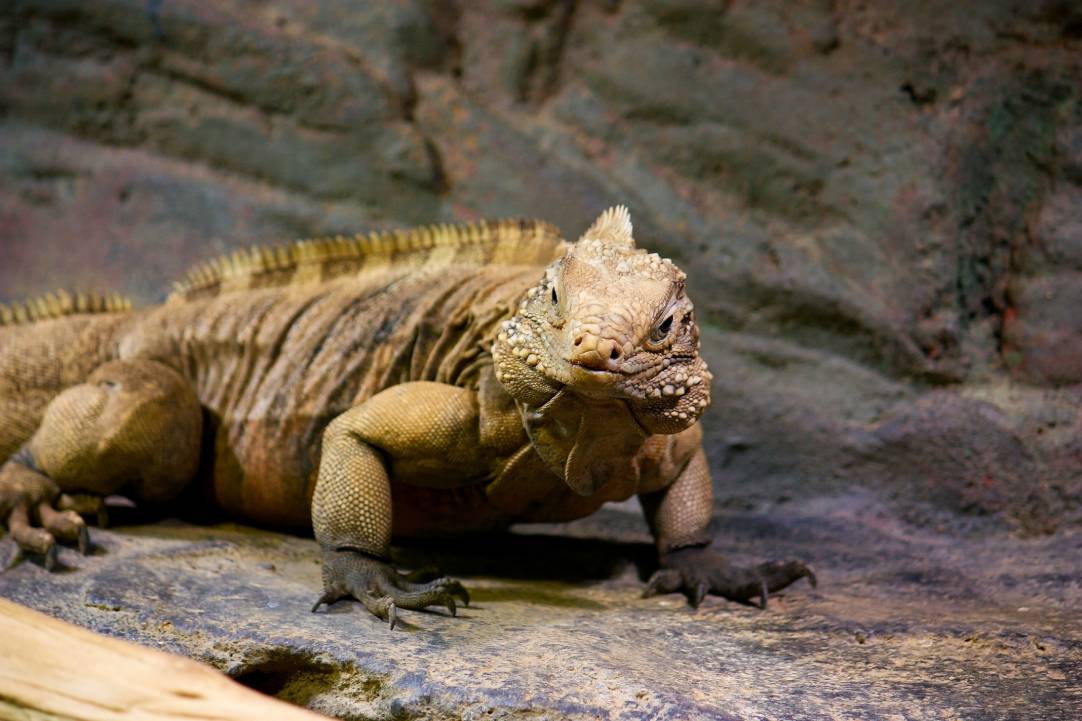
 Conclusion
Conclusion
There is a lot of debate surrounding the nutritional needs of captive iguanas. We are learning more every day about how we can best take care of our scaly friends. We hope that you’ve learned something new and valuable regarding the care and keeping of iguanas.
Remember, it’s always best to consult your vet when it comes to questions about keeping your pet. A trained exotic veterinarian can help explain anything you need to know about your new family member.
 What Do Iguanas Eat?
What Do Iguanas Eat?